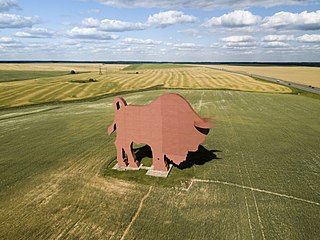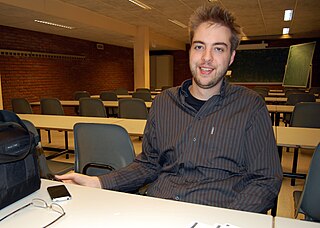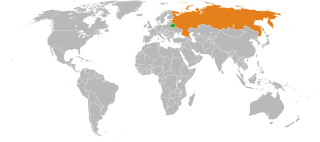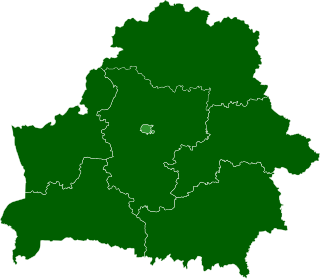
After achieving independence from the Soviet Union, the Republic of Moldova established relations with other European countries. A course for European Union integration and neutrality define the country's foreign policy guidelines.

The Commonwealth of Independent States (CIS) is a regional intergovernmental organization in Eurasia. It was formed following the dissolution of the Soviet Union in 1991. It covers an area of 20,368,759 km2 (7,864,422 sq mi) and has an estimated population of 239,796,010. The CIS encourages cooperation in economic, political, and military affairs and has certain powers relating to the coordination of trade, finance, lawmaking, and security, including cross-border crime prevention.

Minsk is the capital and the largest city of Belarus, located on the Svislach and the now subterranean Niamiha rivers. As the capital, Minsk has a special administrative status in Belarus and is the administrative centre of Minsk Region and Minsk District. As of 2024, it has a population of about two million, making Minsk the 11th-most populous city in Europe. Minsk is one of the administrative capitals of the Commonwealth of Independent States (CIS) and the Eurasian Economic Union (EAEU).

Alexander Grigoryevich Lukashenko is a Belarusian politician who has been the president of Belarus since the office's establishment in 1994. This makes him the longest-serving European president.

Brest Region, also known as Brest Oblast or Brest Voblasts, is one of the six regions of Belarus. Its administrative center is Brest. Other major cities in the region include Baranavichy, and Pinsk. As of 2024, it has a population of 1,308,569.

The national emblem of Belarus features a ribbon in the colors of the national flag, a silhouette of Belarus, wheat ears and a red star. It is sometimes referred to as the coat of arms of Belarus, although in heraldic terms this is inaccurate as the emblem does not respect the rules of conventional heraldry. The emblem is an allusion to one that was used by the Byelorussian SSR, designed by Ivan Dubasov in 1950, with the biggest change being a replacement of the Communist hammer and sickle with a silhouette of Belarus. The Belarusian name is Dziaržaŭny hierb Respubliki Biełaruś, and the name in Russian is Gosudarstvennyĭ gerb Respubliki Belarusʹ.

The Orange Revolution was a series of protests, that lead to political upheaval in Ukraine from late November 2004 to January 2005. It gained momentum primarily due to the initiative of the general population, sparked by the aftermath of the 2004 Ukrainian presidential election run-off which was claimed to be marred by massive corruption, voter intimidation and electoral fraud. Kyiv, the Ukrainian capital, was the focal point of the movement's campaign of civil resistance, with thousands of protesters demonstrating daily. Nationwide, this was highlighted by a series of acts of civil disobedience, sit-ins, and general strikes organized by the opposition movement.

Athletes from Belarus began their Olympic participation at the 1952 Summer Games in Helsinki, Finland, as part of the Soviet Union. After the Soviet Union disbanded in 1991, Belarus, along with four of the other fourteen former Soviet republics, competed in the 1992 Winter Olympics as the Unified Team. Later in 1992, Belarus joined eleven republics to compete as the Unified Team at the Summer Games in Barcelona, Spain. Two years later, Belarus competed for the first time as an independent nation in the 1994 Winter Olympics, held in Lillehammer, Norway.

Dries Buytaert is a Belgian open-source software programmer. He is the founder and lead developer of the Drupal content management system. He also serves as the CTO of Acquia.

The Collective Security Treaty Organization (CSTO) is an intergovernmental military alliance in Eurasia consisting of six post-Soviet states: Armenia, Belarus, Kazakhstan, Kyrgyzstan, Russia, and Tajikistan, formed in 2002. The Collective Security Treaty has its origins in the Soviet Armed Forces, which was replaced in 1992 by the United Armed Forces of the Commonwealth of Independent States, and was then itself replaced by the successor armed forces of the respective independent states.
Union of Councils for Jews in the Former Soviet Union (UCSJ) is a non-governmental organization that reports on the human rights conditions in countries throughout Eastern Europe and Central Asia, exposing hate crimes and assisting communities in need. UCSJ uses grassroots-based monitoring and advocacy, as well as humanitarian aid, to protect the political and physical safety of Jewish people and other minorities in the region. UCSJ is based in Washington, D.C., and is linked to other organizations such as the Moscow Helsinki Group. It has offices in Russia and Ukraine and has a collegial relationship with human rights groups that were founded by the UCSJ in the countries of the former Soviet Union.

Western Ukraine or West Ukraine refers to the western territories of Ukraine. There is no universally accepted definition of the territory's boundaries, but the contemporary Ukrainian administrative regions (oblasts) of Chernivtsi, Ivano-Frankivsk, Lviv, Ternopil and Zakarpattia are typically included. In addition, Volyn and Rivne oblasts are also usually included. It is less common to include Zhytomyr Oblast and Podolia. It includes several historical regions such as Carpathian Ruthenia, Halychyna including Pokuttia, most of Volhynia, northern Bukovina and the Hertsa region, and Podolia. Western Ukraine is sometimes considered to include areas of eastern Volhynia, Podolia, and the small northern portion of Bessarabia.

International relations between the European Union (EU) and Ukraine are shaped through the Ukraine–European Union Association Agreement and the Deep and Comprehensive Free Trade Area (DCFTA). Ukraine is a priority partner within the Eastern Partnership and the European Neighbourhood Policy (ENP). The EU and Ukraine developed an increasingly close relationship, going beyond co-operation, to gradual economic integration and deepening of political co-operation. On 23 June 2022, the European Council granted Ukraine the status of a candidate for accession to the European Union.

Belarus and Russia share a land border and constitute the supranational Union State. Several treaties have been concluded between the two nations bilaterally. Russia is Belarus' largest and most important economic and political partner. Both are members of various international organizations, including the Commonwealth of Independent States, the Eurasian Economic Union, the Collective Security Treaty Organization, and the United Nations.

The Eastern Partnership (EaP) is a joint initiative of the European Union, together with its member states, and six Eastern European countries. The EaP framework governs the EU's relationship with the post-Soviet states of Armenia, Azerbaijan, Belarus, Georgia, Moldova, and Ukraine. The EaP is intended to provide a forum for discussions regarding trade, economic strategy, travel agreements, and other issues between the EU and its Eastern European neighbours. It also aims at building a common area of shared values of democracy, prosperity, stability, and increased cooperation. The project was initiated by Poland and a subsequent proposal was prepared in co-operation with Sweden. It was presented by the foreign ministers of Poland and Sweden at the EU's General Affairs and External Relations Council in Brussels on 26 May 2008. The Eastern Partnership was inaugurated by the EU in Prague, Czech Republic on 7 May 2009.

Nathan Rabin is an American film and music critic. Rabin was the first head writer for The A.V. Club, a position he held until he left the Onion organization in 2013. In 2013, Rabin became a staff writer for The Dissolve, a film website operated by Pitchfork Media. Two of his featured columns at The Dissolve were "Forgotbusters" and "Streaming University".

Presidential elections were held in Belarus on 19 December 2010. The elections had originally been planned for the beginning of 2011. However, the final date was set during an extraordinary session of the National Assembly on 14 September 2010.

The Customs Union of the Eurasian Economic Union or EAEU Customs Union is a customs union of 5 post-Soviet states consisting of all the member states of the Eurasian Economic Union which initially became effective on January 1, 2010 at the date of implementation of the common external tariff (CET) as the Customs Union of the Eurasian Economic Community or Customs Union of Russia, Belarus and Kazakhstan. It was inherited from the Eurasian Economic Community and is now regulated by Part Two of the Treaty on the Eurasian Economic Union, EAEU Customs Code, other international agreements and by decisions of supranational bodies as Supreme Eurasian Economic Council, Intergovernmental Council and Eurasian Economic Commission.

The European Union–Ukraine Association Agreement is a European Union Association Agreement between the European Union (EU), the European Atomic Energy Community (Euratom), Ukraine and the EU's 28 member states at the time. It establishes a political and economic association between the parties. The agreement entered into force on 1 September 2017; previously parts had been provisionally applied. The parties committed to co-operate and converge economic policy, legislation, as well as regulation across a broad range of areas, including equal rights for workers, steps towards visa-free movement of people, the exchange of information and staff in the area of justice, the modernisation of Ukraine's energy infrastructure and access to the European Investment Bank (EIB). The parties committed to regular summit meetings and meetings among ministers, other officials and experts. The agreement furthermore establishes a Deep and Comprehensive Free Trade Area between the parties.
Minsk Pride is a gay pride parade in Minsk, Belarus. This is a festival in support of tolerance for gays, lesbians, bisexuals and transgender people in Belarus.


















